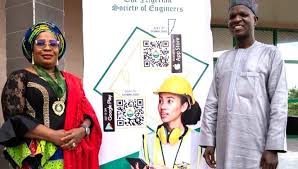In a major step towards promoting professionalism and curbing the spread of unqualified practitioners in Nigeria’s engineering space, the Nigerian Society of Engineers (NSE) has launched a dedicated mobile application for its members. The app, simply named the “NSE Members App,” was officially unveiled in Abuja by the Director-General of the National Information Technology Development Agency (NITDA), Malam Kashifu Inuwa, who was represented by Mr. Salisu Kaka, Director of E-Government and Digital Economy.
Available on both the Google Play Store and the Apple App Store, the application is designed to strengthen internal coordination among engineers and provide a reliable platform for verifying legitimate professionals within the sector. Through the app, registered NSE members can stay updated on industry events, register for projects, and participate in national development initiatives, including social impact programmes.
Describing the move as a forward-thinking innovation, NITDA commended the NSE’s efforts as aligning with President Bola Tinubu’s digital infrastructure vision, which aims to integrate and simplify the delivery of public services across institutions. Inuwa emphasized that this digital effort by the NSE reflects a rising commitment to developing technologies that serve the public good. He noted that, if well integrated, the platform could serve as a replicable model for other professions seeking to adopt digital solutions to strengthen accountability and boost efficiency.
At the heart of the initiative is the fight against quackery—an issue that continues to undermine the engineering profession in Nigeria. NSE President Margaret Oguntala explained that the app was developed to create a direct solution for identifying and verifying qualified engineers. By using the app, clients, employers, and fellow professionals can instantly determine whether someone claiming to be an engineer is indeed certified by the NSE.
Oguntala stated that this verification tool will help restore confidence in the profession, especially in areas where unregistered individuals have taken advantage of regulatory gaps to operate without qualifications. She revealed that the society is also working towards expanding access to the verification system so that members of the public can independently confirm the credentials of any professional before hiring.
Beyond its regulatory function, the app is expected to foster stronger communication between the NSE’s national headquarters and its various branches across the country. Oguntala added that it will simplify member participation in training sessions, community development programmes, and other professional engagements, all of which are essential to continuous development and improved standards in engineering.
This digital leap by the NSE is particularly significant given the longstanding consequences of unchecked quackery in the Nigerian construction industry. A recent Nairametrics report highlighted that over 221 buildings collapsed between 1974 and 2019 across the country, with Lagos State alone recording 167 collapses between 2000 and 2021. These incidents have led to massive property losses and loss of life, with over 6,000 households affected and an estimated N3.2 trillion in damages, according to the Building Collapse Prevention Guild.
In light of these challenges, the Lagos State Government has intensified its crackdown on unqualified builders and suppliers of substandard building materials. As part of its reform efforts, the Lagos State Materials Testing Laboratory Agency (LSMTL) has introduced an Electronic Geographic Information System to monitor testing activities, eliminate fraudulent practices, and improve transparency. The agency’s General Manager, Engineer Olayinka Abdul, noted that consultants will operate within designated zones, and their details will be listed publicly to promote transparency and professional accountability in materials testing.
The NSE’s new digital platform, therefore, enters the sector at a crucial time, when efforts to professionalize and sanitize the construction and engineering industries are gaining momentum. It not only represents a shift towards technology-driven regulation but also offers a practical tool for promoting safety, credibility, and trust within Nigeria’s rapidly expanding infrastructure and development landscape.










